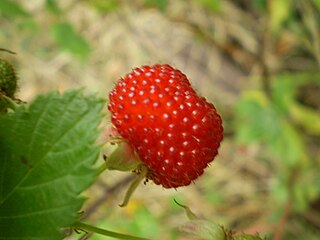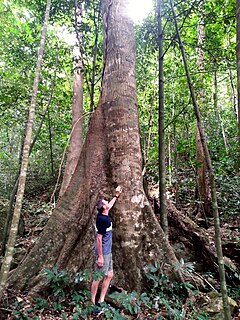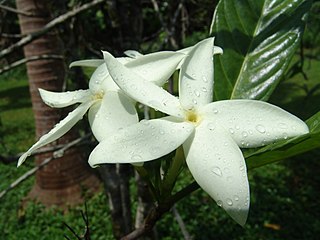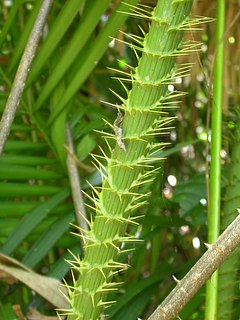
Normanbya is a monotypic genus of palms containing the single species Normanbya normanbyi, which is known by the common name black palm It is endemic to Queensland, Australia and is threatened by habitat destruction.

Rubus probus, commonly known as Atherton raspberry or wild raspberry, is a scrambling shrub in the family Rosaceae native to Malesia and Queensland.

Atractocarpus chartaceus, commonly known as the narrow-leaved gardenia, is a species of evergreen flowering plant in the madder and coffee family Rubiaceae. It is mostly found in subtropical rainforest of eastern Australia, and it is cultivated for its fragrant flowers and colourful fruit.

Syzygium forte, commonly known as flaky-barked satinash, white apple or brown satinash, is a tree in the family Myrtaceae native to New Guinea and northern Australia.

Palaquium galactoxylum, commonly known as Cairns pencil cedar, Daintree maple or red silkwood, is a species of very large tree in the family Sapotaceae which is endemic to rainforests of New Guinea and northern Australia. It can produce spectacularly large buttress roots.

Gardenia actinocarpa is a rare and endangered plant in the madder family Rubiaceae that grows in a very restricted area within the Wet Tropics rainforest of north-east Queensland.

Atractocarpus hirtus, commonly known as the hairy gardenia or native loquat, is a plant in the madder family Rubiaceae, a large family of some 6,500 species with a cosmopolitan distribution. This species is endemic to north-east Queensland, Australia.

Lobelia trigonocaulis, the forest lobelia is a creeping or trailing herb, found in moist forest areas in New South Wales and Queensland in Australia. Blue to mauve flowers form between the months of December and May. Leaves are near circular or ovate in shape; ranging from about 4.0 to 5.5 cm long and 2.5 to 3.8 cm wide.

Argophyllum curtum is a plant in the Argophyllaceae family endemic to a small part of north eastern Queensland. It was described and named in 2018.
Argophyllum loxotrichum is a plant in the Argophyllaceae family endemic to a small part of north eastern Queensland. It was described and named in 2018.
Argophyllum lejourdanii is a plant in the Argophyllaceae family endemic to a part of north eastern Queensland, Australia. It was described and named in 1863.
Argophyllum ferrugineum is a plant in the Argophyllaceae family endemic to a small part of north eastern Queensland. It was described and named in 2018.
Argophyllum heterodontum is a plant in the Argophyllaceae family endemic to a small part of north eastern Queensland. It was described and named in 2018.
Argophyllum iridescens is a plant in the Argophyllaceae family endemic to a small part of north eastern Queensland. It was described and named in 2018.
Stephania tuberosa is a plant in the family Menispermaceae which is endemic to Queensland. It grows as a vine with a stem diameter of up to 5 cm (2.0 in) and produces a distinctive large tuber on the ground which can be up to 50 cm (20 in) diameter.

Calamus moti is a climbing rainforest plant in the palm family Arecaceae, which is endemic to Queensland. It has a slim flexible stem which does not support the plant, instead it climbs to the forest canopy with the assistance of long tendrils armed with stout recurved hooks.

Cleistanthus hylandii is a plant in the family Phyllanthaceae which is endemic to north east Queensland, Australia. It was first described by Airy Shaw in the Kew Bulletin in 1976.

Syzygium unipunctatum is a small tree in the family Myrtaceae. It is endemic to the rainforests of the Wet Tropics of Queensland.

Calamus radicalis, commonly known as vicious hairy mary, is a plant in the palm family Arecaceae endemic to the rainforests of north east Queensland, Australia. It is a climbing palm and uses sharp strong hooks on the fronds and tendrils to attach to other vegetation and provide support as it grows higher.

Calamus vitiensis, commonly known as the Dunk Island lawyer vine, solitary lawyer vine or Mission Beach wait-a-while, is a climbing palm in the family Arecaceae. It grows in rainforests from the Maluku Islands east through New Guinea and the Solomon Islands to Fiji and Vanuatu, and south to Queensland, Australia.















